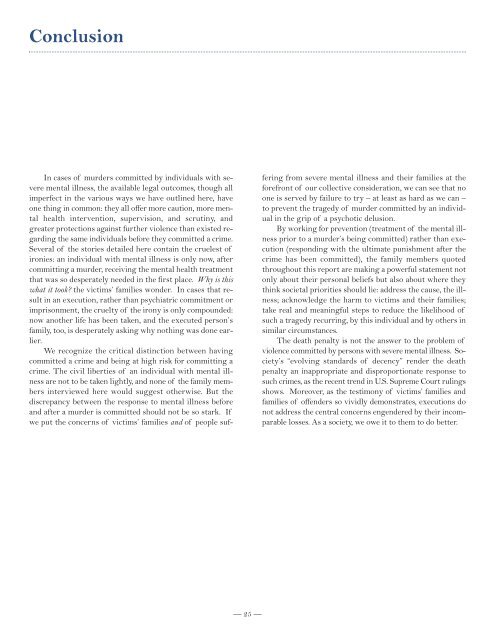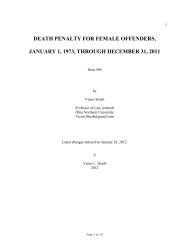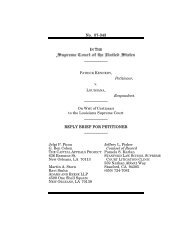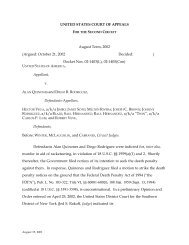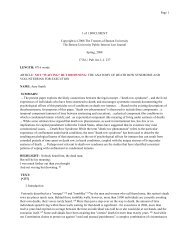ConclusionIn cases of murders committed by individuals with severemental illness, the available legal outcomes, though allimperfect in the various ways we have outlined here, haveone thing in common: they all offer more caution, more mentalhealth intervention, supervision, and scrutiny, andgreater protections against further violence than existed regardingthe same individuals be<strong>for</strong>e they committed a crime.Several of the stories detailed here contain the cruelest ofironies: an individual with mental illness is only now, aftercommitting a murder, receiving the mental health treatmentthat was so desperately needed in the first place. Why is thiswhat it took? the victims’ families wonder. In cases that resultin an execution, rather than psychiatric commitment orimprisonment, the cruelty of the irony is only compounded:now another life has been taken, and the executed person’sfamily, too, is desperately asking why nothing was done earlier.We recognize the critical distinction between havingcommitted a crime and being at high risk <strong>for</strong> committing acrime. The civil liberties of an individual with mental illnessare not to be taken lightly, and none of the family membersinterviewed here would suggest otherwise. But thediscrepancy between the response to mental illness be<strong>for</strong>eand after a murder is committed should not be so stark. Ifwe put the concerns of victims’ families and of people sufferingfrom severe mental illness and their families at the<strong>for</strong>efront of our collective consideration, we can see that noone is served by failure to try – at least as hard as we can –to prevent the tragedy of murder committed by an individualin the grip of a psychotic delusion.By working <strong>for</strong> prevention (treatment of the mental illnessprior to a murder’s being committed) rather than execution(responding with the ultimate punishment after thecrime has been committed), the family members quotedthroughout this report are making a powerful statement notonly about their personal beliefs but also about where theythink societal priorities should lie: address the cause, the illness;acknowledge the harm to victims and their families;take real and meaningful steps to reduce the likelihood ofsuch a tragedy recurring, by this individual and by others insimilar circumstances.The death penalty is not the answer to the problem ofviolence committed by persons with severe mental illness. Society’s“evolving standards of decency” render the deathpenalty an inappropriate and disproportionate response tosuch crimes, as the recent trend in U.S. Supreme Court rulingsshows. Moreover, as the testimony of victims’ families andfamilies of offenders so vividly demonstrates, executions donot address the central concerns engendered by their incomparablelosses. As a society, we owe it to them to do better.__ 25 __
Appendix A: RecommendationsIn bringing together the voices of victims’ families and offamilies of the executed, all of whom have been affected by issuesof severe mental illness, murder, and the death penalty, <strong>Double</strong><strong>Tragedies</strong> has created an intersection of relevantconsiderations: the inappropriateness of the death penalty as aresponse to homicides committed by persons with severe mentalillness, how to prevent or minimize the risk of such homicidesbe<strong>for</strong>e they occur, and how to recognize and address the needs offamilies of victims of people with severe mental illness and familiesof offenders with severe mental illness.The core recommendations that grow out of our <strong>for</strong>egoingdiscussion are these:• Individuals who committed crimes as a result of impairmentscaused by severe mental illnesses should not be sentencedto death or executed• Everything possible should be done to re<strong>for</strong>m and improvethe mental health system so that individuals with severemental illnesses can receive af<strong>for</strong>dable and appropriate treatmentthey need, thus preventing, or at least minimizing to afar greater degree than we now do, the risk of violence committedby some individuals who experience acute psychoticsymptoms of mental illness• <strong>Families</strong> of victims killed by persons with severe mental illnessesshould be treated with respect and dignity throughoutthe criminal or mental health proceedings, and their rights toin<strong>for</strong>mation and participation should not be denied• <strong>Families</strong> of the executed should be recognized as victims andgiven the assistance due to any victims of traumatic lossIn bringing together these multiple considerations, we areentering a conversation that has already been going on. Muchgood work has already been done to develop policy recommendationsin each of these areas. Our goal here is there<strong>for</strong>e to summarizeand refer readers to the recommendations that colleagueorganizations have devised in these four areas and to add our endorsementof those recommendations.We are entering an existing conversation, but entering itwith a unique voice – the voice of victims fitting these specificprofiles. As a result, our goal is to encourage an integrated understandingand advocacy by urging readers to become familiarwith aspects of the issue, and with specific policy analyses andrecommendations, that may have up to now lain outside their owndirect area of involvement. To address the very difficult problemof murders committed by individuals with severe mental illnessand the resulting questions about appropriate response –including the question of death penalty or no death penalty – itwill be essential to encompass the variety of perspectives of thosewho have a stake in the issue.What follows is a summary of what we believe are the keyrecommendations that have been developed in each area. Westrongly encourage readers to seek out the full text of each ofthe reports referenced here. For links to those reports, and suggestionsof further reading and resources on the issue of mentalillness and the death penalty, see Appendix C.Prohibiting the Death Penalty <strong>for</strong> Persons with Severe MentalIllnessIn 2006, the American Bar Association’s House of Delegatesadopted a Recommendation developed by a Task Force on MentalDisability and the Death Penalty and officially endorsed by theAmerican Psychiatric Association, the American PsychologicalAssociation, and the National Alliance on Mental Illness. TheRecommendation states that the ABA, “without taking a positionsupporting or opposing the death penalty,” urges jurisdictions thatcurrently make use of the death penalty to exempt people withmental disorders and disabilities.The ABA Task Force was created in the aftermath of theU.S. Supreme Court’s Atkins v. Virginia ruling, which, as we notedat the start of our discussion, ruled the execution of defendantswith mental retardation unconstitutional. The ABA, as their reportstates, “recognized that Atkins offered a timely opportunity toconsider the extent, if any, to which other types of impaired mentalconditions ought to lead to exemption from the death penalty.”The Atkins and then the 2005 Roper v. Simmons decisions werebased on the principle that the death penalty, if it is to be used atall, ought to serve either a deterrent or a retributive purpose, andthat in the case of people with reduced capacity <strong>for</strong> understanding,judgment, and self-control, it serves neither purpose.Determining that a given defendant was a juvenile (underthe age of 18) at the time of the crime is a straight<strong>for</strong>ward matter.Determining whether the defendant has mental retardationis somewhat more difficult; it has generally been defined as havingan IQ of 70 or below, deficits in adaptive functioning, and ageof onset prior to 18. Determining exactly what is meant by mentalillness requires still more guidance, and the ABA Recommendationdefines mental illness fairly narrowly and precisely, refutingthe concern that any defendant charged with capital murderwould easily be able to claim mental illness. The ABA’s reportsays that theirpredicate <strong>for</strong> exclusion from capital punishment underthis part of the Recommendation is that offenders havea “severe” disorder or disability, which is meant to signifya disorder that is roughly equivalent to disorders thatmental health professionals would consider the most serious“Axis I diagnoses.” These disorders include schizophreniaand other psychotic disorders, mania, majordepressive disorder, and dissociative disorders—withschizophrenia being by far the most common disorderseen in capital defendants. In their acute state, all of__ 26 __


